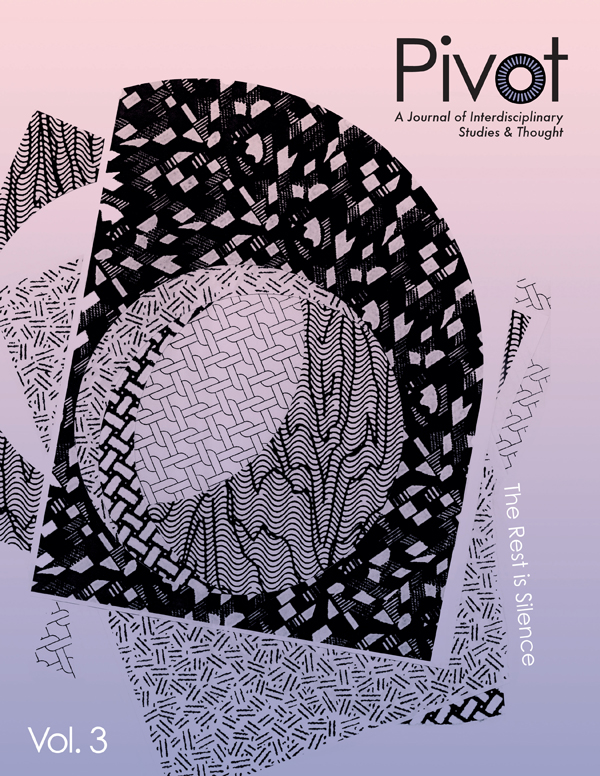"Aggravatin' Papa": Race, Omission, and Discursive Liminality in Ernest Hemingway's The Sun Also Rises
DOI:
https://doi.org/10.25071/2369-7326.36118Abstract
My essay constructs a postcolonial theoretical framework to investigate a scene in Ernest Hemingway's 1926 novel, The Sun Also Rises. The scene suggests that an African-American character--a musician performing the popular jazz song "Aggravatin' Papa"--may share a sexual history with the novel's white female protagonist. The text strategically silences the black character's voice at several moments in the dialogue. By exhuming the musician's lyrics and showcasing the silenced voice in this intertextual relationship, I argue that the marginalized minority voice is, in fact, central to Hemingway’s modernist experimentation. In the very process of its appropriation and silencing in the novel, the black presence bursts forth from its liminal discursive space and intervenes in the narrative’s construction of difference.References
Bhabha, Homi K. The Location of Culture. New York: Routledge, 1994. Print.
Comley, Nancy R. and Robert Scholes. Hemingway’s Genders: Rereading the Hemingway Text. New Haven: Yale UP, 1994. Print.
DeKoven, Marianne. “The Politics of Modernist Form.” New Literary History 23 (Summer 1992): 675-90. Print. DOI: https://doi.org/10.2307/469225
Duck, Leigh Anne. The Nation’s Region: Southern Modernism, Segregation, and U.S. Nationalism. Athens, GA: U of Georgia P, 2006. Print.
Foucault, Michel. The History of Sexuality, Volume I: An Introduction. Trans. Robert Hurley. New York: Pantheon Books, 1978. Print.
Giles, Paul. Virtual Americas: Transnational Fictions and the Transatlantic Imaginary. Durham: Duke UP, 2002. Print. DOI: https://doi.org/10.1215/9780822384045
Giles, Steve. “Afterward: Avant-Garde, Modernism, Modernity: A Theoretical Overview.” Theorizing Modernism: Essays in Critical Theory. Ed. Steve Giles. New York: Routledge, 1993. 171-86. Print.
Hemingway, Ernest. Death in the Afternoon. 1932. New York: Charles Scribner’s Sons, 1960. Print.
Giles, Steve. The Sun Also Rises. 1926. New York: Scribner, 2003. Print.
Herring, Scott. “Regional Modernism: A Reintroduction.” Modern Fiction Studies 55.1 (Spring 2009): 1-10. Print. DOI: https://doi.org/10.1353/mfs.0.1588
Hunter, Alberta, perf. “Aggravatin’ Papa (Don’t You Try To Two-Time Me).” By Roy Turk and J. Russel Robinson. Alberta Hunter, Complete Recorded Works in Chronological Order, 1923-1924, Volume 2. Document Records, 1996. CD.
Jameson, Frederic. The Political Unconscious: Narrative as a Socially Symbolic Act. Ithaca, NY: Cornell UP, 1981. Print.
Kennedy, J. Gerald. Imagining Paris: Exile, Writing, and American Identity. New Haven: Yale UP, 1993. Print.
Kinnamon, Keneth. “Hemingway and Politics.” The Cambridge Companion to Hemingway. Ed. Scott Donaldson. Cambridge: Cambridge UP, 1996. 149-69. Print. DOI: https://doi.org/10.1017/CCOL0521454794.008
Moddelmog, Debra A. “Reconstructing Hemingway’s Identity: Sexual Politics, the Author, and the Multicultural Classroom.” Narrative (October 1993): 187-206. Rpt. in Hemingway: Seven Decades of Criticism. Ed. Linda Wagner-Martin. East Lansing: Michigan State UP, 1998. 239-63. Print.
Nagel, James. “Literary Impressionism and In Our Time.” The Hemingway Review 6.2 (Spring 1987): 17-26. Print.
North, Michael. The Dialect of Modernism: Race, Language, and Twentieth-Century Literature. New York: Oxford UP, 1994. Print.
Peretti, Burton W. “Plantation Cafés: Jazz, Postcolonial Theory, and Modernism.” Postcolonial Discourse and Changing Cultural Contexts: Theory and Criticism. Eds. Gita Rajan and Radhika Mohanram. Westport, CT: Greenwood Press, 1995. 89-99. Print.
Robison, Lori. “Region and Race: National Identity and the Southern Past.” A Companion to the Regional Literatures of America. Ed. Charles L. Crow. Malden, MA: Blackwell Publishing, 2003. 57-73. Print.
Said, Edward. Culture and Imperialism. New York: Vintage Books, 1994. Print.
Sandoval, Chela. “U.S. Third-World Feminism: The Theory and Method of Oppositional Consciousness in the Postmodern World.” Genders 10 (Spring 1991): 1-24. Rpt. in Feminist Postcolonial Theory: A Reader. Eds. Reina Lewis and Sara Mills. New York: Routledge, 2003. 75-99. Print.
Stovall, Tyler. “Gender, Race, and Miscegenation: African Americans in Jazz Age Paris.” The Modern Woman Revisited: Paris Between the Wars. Eds. Whitney Chadwick and Tirza True Latimer. New Brunswick, NJ: Rutgers UP, 2003. Print.
Stovall, Tyler. Paris Noir: African Americans in the City of Light. Boston: Houghton Mifflin Company, 1996. Print.
Svoboda, Frederic. “Who Was That Black Man?: A Note on Eugene Bullard and The Sun Also Rises.” The Hemingway Review 17.2 (Spring 1998): 105-110. Print.
Turk, Roy and J. Russel Robinson. Aggravatin’ Papa (Don’t You Try To Two-Time Me). New York: Waterson, Berlin & Snyder Co., 1922. Print.

